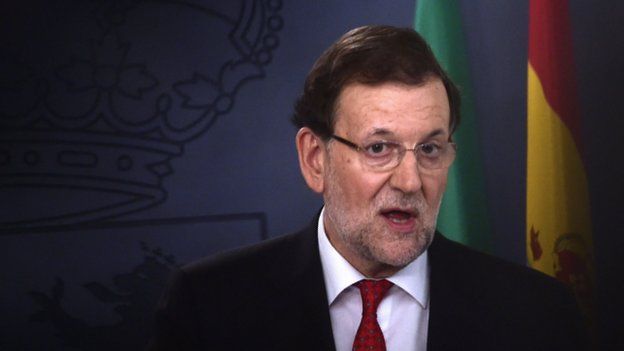Spanish parties play power games over Greek bailout
- Published

Spanish Prime Minister Mariano Rajoy celebrated the financial rescue deal struck between eurozone leaders and Greece earlier this month as "good news".
Describing the €82bn-€86bn (£59bn-£62bn) in-principle bailout agreement in return for stringent austerity reforms as "reasonable", the conservative Spanish leader said that "Europe has shown great solidarity with Greece".
But does Mr Rajoy have other reasons to celebrate, notably a political victory over the Greek anti-austerity Syriza government that may help his Popular Party (PP) secure a second term in Spanish elections at the end of this year?
Mr Rajoy's term in office has seen the powerful rise of leftist anti-austerity party Podemos, which has galvanised a popular challenge to the government's insistence that tough economic medicine and tight spending controls are the only way for Spain to emerge from its own financial and economic meltdown.
Unemployment reached 27% at the start of 2013 before falling back to the current rate of 22%.
Spain, which received a eurozone bailout for its crippled banking sector in 2012, has been on the receiving end of its own dose of austerity medicine from Europe since the PSOE socialist government of Jose Luis Rodriguez Zapatero was required to cut pensions and state workers' salaries back in 2010.
Spain's 'bailout'
- In June 2012, Spain formally requested financial assistance for its banks, which had been left with billions of euros worth of bad loans from the collapse of the country's property boom and the recession that followed
- A deal was agreed with its eurozone partners the following month to make €100bn of loans available to its banks, though it is believed only about €40bn was ever called in
- Economy Minister Luis de Guindos was keen to stress that it was "not a rescue" as the help was for the financial system, not the economy as a whole
- It was different to the bailouts agreed for Greece, Portugal and Ireland, as those deals came with demands for tax rises and stringent spending cuts
- Spain exited the programme in January 2014
Bubble burst
When Syriza won January's Greek elections, Podemos too seemed to be on the crest of an unstoppable wave against austerity politics in Spain only a year after being formed.
When Podemos leader Pablo Iglesias travelled to Athens to join Syriza's Alexis Tsipras for his final campaign rally, the Spanish radical party was leading the polls with 28% support.
Mr Iglesias said then that Mr Tsipras' victory signalled "the failure of austerity politics" and that Greece would now have "a real Greek prime minister and not a delegate of Angela Merkel".
But the way the Syriza government caved in to pressure from eurozone leaders led by Germany's Chancellor, Mrs Merkel, may have burst Podemos's bubble.
Podemos, challenged by the rise of another new anti-corruption party, the centrist Citizens, has slipped to third place on just 18%, according to a poll published by the newspaper El Pais last weekend. The poll put the PSOE in the lead on 23.5% with the PP on 23%.
'Killed hopes'
Marleen Rueda, 48, a consultant on international labour issues, from Madrid, says her enthusiasm for Podemos as a potential force for change has been jolted.
"What the Greek deal has done is to pour cold water over any hopes that there could be a change of European policy," she says. "This has killed people's hopes.
"The emerging parties like Podemos have no sway in the formulation of European policy.
"I don't feel as a citizen that I can have any influence.
"Parties like Podemos led us to believe that they could change things in Europe, but this is not the reality."
Ms Rueda, who sees the new bailout deal as a "punishment for the Greeks", adds: "Europe does not want any voices which question the sole European policy of austerity to emerge.
"It is an imposition by Europe which snubs a democratically elected government."
More battles to come
Podemos, which has pledged to review Spain's ballooning public debt, decries what it considers a bad deal for Greece and a blow to democracy.
#ThisIsACoup trended worldwide - it started with a movement of left-wing activists in Spain
But Pablo Bustinduy, Podemos's international relations spokesman, believes Spaniards realise the fight against austerity is only just beginning and Spain is in a far stronger position than Greece to win it.
"The circumstances of the two countries are tremendously different," he says.
"Spain has not been formally bailed out and represents 11% of the eurozone economy compared to Greece's 2%.
"There will be a reaction; this is just the first stage, and there will be more battles."
As Podemos sees its grip on the Spanish electorate weaken, Jose Ignacio Torreblanca, head of the Madrid office of the European Council on Foreign Relations, believes the party has decided to cut itself free from its emotional connection with the Syriza government.
"In light of Tsipras's disastrous management of relations with the eurozone and the punishing deal finally reached, Podemos has subtly begun to distance itself from Greece," he says.
Mr Torreblanca, who has written a book on Podemos entitled Asaltar Los Cielos (Storm The Heavens), notes the party that greeted Syriza's electoral triumphs with euphoria is now choosing to ignore Mr Tsipras's pragmatic shift to the centre.
"They have cooled the rhetoric on Greece as Rajoy tries to turn the spotlight on the chaos outside Greek banks and how something similarly catastrophic could happen in Spain if Podemos comes to power."
- Published6 July 2015
- Published23 May 2015
- Published14 March 2015
- Published28 April 2015
- Published31 January 2015
- Published23 March 2015